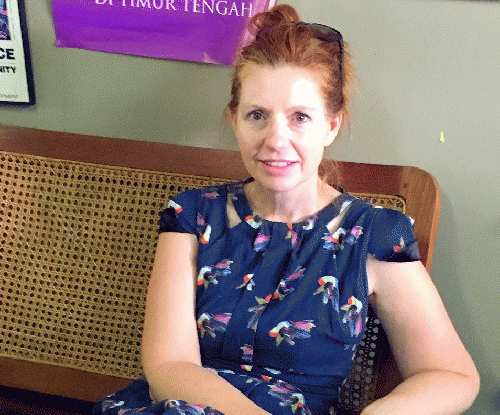
Kate Lappin who leads the Asia Pacific Forum on Women, Law and Development (APWLD)
(Image by CNS (Citizen News Service)) Details DMCA
The inter-governmental meeting of the High-Level Political Forum (HLPF) on sustainable development is being held during 10-19 July 2017, to review the progress made by nations around some of the Sustainable Development Goals (SDGs), which governments have already committed to achieve by 2030. As we all know, climate justice is integral to sustainable development, yet we see governments pursuing development models that are actually pushing us backwards not only on climate justice but also on sustainable development.
Shobha Shukla, Managing Editor of CNS (Citizen News Service), was recently in conversation with Kate Lappin, the firebrand Regional Coordinator of Asia Pacific Forum on Women, Law and Development (APWLD), an organisation which is empowering women to use law as an instrument of change and promoting women's rights in the Asia-Pacific region.
Here are some excerpts from the interview.
CNS: How to accelerate progress towards achieving SDGs?
Kate Lappin: "We see a lack of commitment from governments to redress the system and genuinely shift to a sustainable development model. While countries have initiated processes to achieve SDGs, most of them really do not want to do anything that challenges their existing economic model that underpins development. In the briefs that governments submitted for HLPF, none of them are looking at Goal10 related to reducing inequality within and between countries. So any work done on sustainable development still benefits a tiny minority. For example, in order to achieve Sustainable Development Goal 7 (Ensure access to affordable, reliable, sustainable and modern energy for all) even if nations are shifting from coal energy to more renewable forms of energy, they are still doing it in a way that provides the 'profits of energy and access to energy' to only corporations and does not address sustainable development aspects of inequality as well as the environment.
We are looking for a more concrete commitment to address the systems that are driving an unequal and unsustainable development. For example, the RCEP (Regional Comprehensive Economic Partnership) in the Asia-Pacific region is a barrier to development justice. Then again, the fuelling of militarism, authoritarianism and patriarchal governance is a clear threat to sustainable development.
[US President] Trump's example of pulling out of the Paris agreement is aimed at watering down global agreements by fuelling individualism and conflicts, rather than solidarity. So right now, we have a very weak global system that is designed to care for corporations alone."
CNS: Why democratically elected governments function like fundamentalist and capitalist forces whose policies harm those very people who elected them?
(Note: You can view every article as one long page if you sign up as an Advocate Member, or higher).





